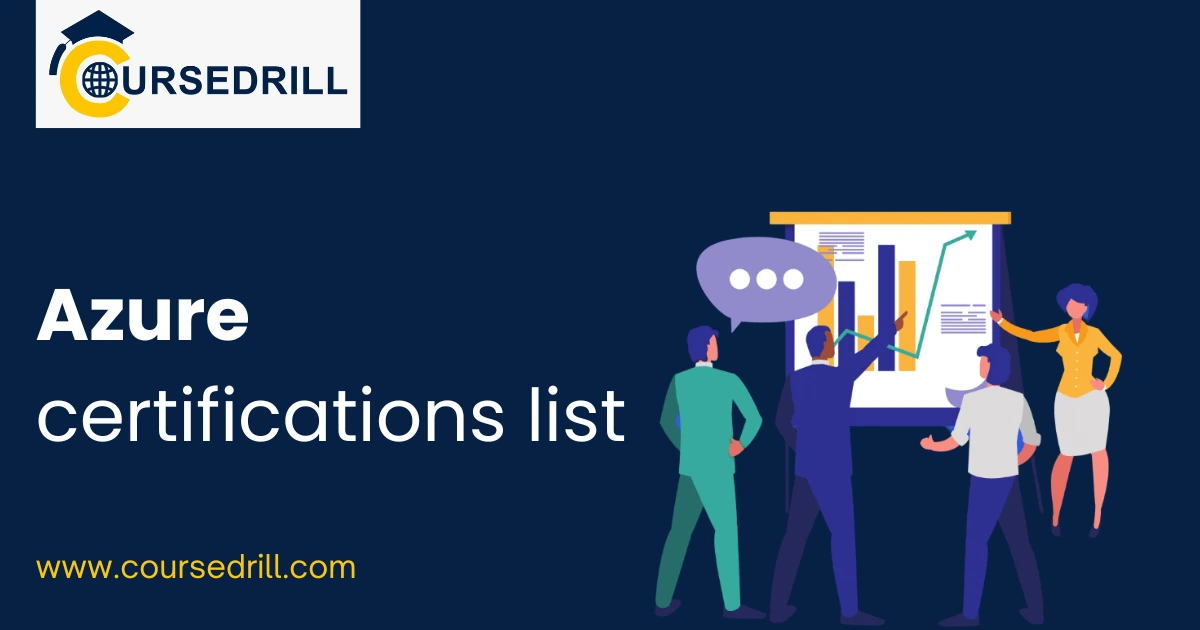- Posted on
- admin
- No Comments
Azure Certifications List
The Ultimate Guide to Azure Certifications: A Comprehensive List & Career Roadmap
Introduction
Overview of Azure Certifications
Microsoft Azure certifications validate an individual’s skills and expertise in using Microsoft’s cloud computing services. These certifications help professionals demonstrate their abilities in cloud architecture, security, data management, AI, and development. With businesses increasingly adopting Azure, certification holders have an edge in securing well-paying jobs.
Importance of Azure Certifications in the Cloud Industry
As organizations migrate to the cloud, the demand for Azure-certified professionals is rising. Holding an Azure certification can lead to better job opportunities, higher salaries, and career advancement. It also ensures proficiency in the latest cloud technologies.
Who Should Consider Getting Azure Certified?
Azure certifications are ideal for IT professionals, developers, system administrators, security experts, data engineers, and business analysts looking to advance their cloud skills and improve job prospects.
Understanding Azure Certification Level
Microsoft Azure certifications are categorized into four levels:
Foundational Level: For beginners with basic cloud knowledge.
Associate Level: For professionals with some cloud experience.
Expert Level: For advanced users managing cloud solutions.
Specialty Certifications: Focused on specific Azure technologies.
Microsoft Azure Certification Paths
Role-Based Certifications
Microsoft introduced role-based certifications to align with real-world job roles. These include administrator, developer, security engineer, data engineer, solutions architect, and DevOps engineer certifications.
Specialty Certifications
Specialty certifications focus on niche areas like security, AI, IoT, and databases, helping professionals specialize in high-demand fields.
Retired & Replaced Certifications
Some older Azure certifications have been retired and replaced with new exams to keep up with industry advancements. Keeping track of these changes ensures professionals are certified in the latest technologies.
Foundational Level Certification
AZ-900: Microsoft Azure Fundamentals
Overview & Purpose
AZ-900 is designed for individuals new to cloud computing. It validates basic knowledge of cloud services and how Azure operates.
Target Audience
Ideal for students, business professionals, and beginners with no prior technical experience.
Exam Structure & Topics
Cloud concepts
Azure services
Azure pricing and lifecycle
Security and compliance
Trust, privacy, and governance
Career Benefits
This certification serves as an entry point into cloud computing and provides a strong foundation for advanced certifications.
Associate Level Certification
AZ-104: Microsoft Azure Administrator
Responsibilities of an Azure Administrator
Azure administrators manage cloud services, including storage, networking, and security.
Key Exam Topics
Managing Azure identities and governance
Implementing storage solutions
Configuring virtual networks
Securing and monitoring Azure resources
AZ-204: Developing Solutions for Microsoft Azure
Role of an Azure Developer
Developers create and maintain cloud-based applications using Azure services.
Key Exam Areas
Developing Azure compute solutions
Implementing Azure security
Monitoring and troubleshooting applications
Expert Level Certifications
AZ-305: Designing Microsoft Azure Infrastructure Solutions
Responsibilities of a Solutions Architect
Solutions architects design and implement cloud solutions tailored to business needs.
Exam Content & Study Areas
Designing identity, governance, and monitoring solutions
Implementing data storage and security solutions
Designing infrastructure solutions
AZ-400: Designing and Implementing Microsoft DevOps Solutions
Role of a DevOps Engineer in Azure
DevOps engineers automate and optimize cloud processes for development and deployment.
Key Skills and Exam Details
Implementing continuous integration and delivery
Infrastructure automation using Azure DevOps tools
Monitoring and feedback mechanisms
Specialty Certifications
SC-100: Microsoft Cybersecurity Architect
SC-200: Microsoft Security Operations Analyst
SC-300: Microsoft Identity and Access Administrator
SC-400: Microsoft Information Protection Administrator
DP-300: Administering Relational Databases on Microsoft Azure
Retired & Replaced Certifications
Previously Available Certifications
Older certifications like AZ-103, AZ-203, and DP-200 have been replaced with updated versions.
New Alternatives & Transitioning Paths
Microsoft provides transition exams for professionals holding older certifications to migrate to new ones.
Choosing the Right Azure Certification for Your Career
Consider your current skills, job role, and career aspirations before selecting a certification. Certifications align with various career paths, including administration, development, and security.
Exam Preparation Strategies
Utilize official Microsoft Learn materials.
Enroll in online training courses.
Take practice exams.
Engage in hands-on labs and projects.
Cost & Renewal of Azure Certifications
Azure certifications have associated fees, ranging from $99 to $165 per exam. Certifications must be renewed periodically through free renewal assessments.
Azure Certification Benefits & Career Impac
Certified professionals have better job prospects, higher salaries, and opportunities in top organizations.
Companies Hiring Azure-Certified Professionals
Tech giants such as Microsoft, Amazon, and Google, along with enterprises and startups, actively hire Azure-certified professionals.
Common Myths & Misconceptions About Azure Certifications
You don’t need prior experience to get certified.
Azure certifications are valuable beyond just development roles.
Comparing Azure Certifications with AWS & Google Cloud
Azure is enterprise-focused, AWS is more developer-centric.
Azure integrates better with Microsoft services.
Industry Trends & Future of Azure Certifications
The demand for Azure-certified professionals continues to grow with advancements in AI, IoT, and security.
Learning Paths for Azure Beginners
Online courses, hands-on labs, and community support make Azure learning accessible.
Community Support & Networking for Azure Learners
Joining Microsoft forums, online groups, and attending conferences can accelerate learning and career growth.
Real-Life Success Stories of Azure-Certified Professionals
Many professionals have transitioned to better roles and increased salaries after obtaining Azure certifications.
Conclusion & Next Steps
Getting Azure certified opens numerous career opportunities in the cloud industry. Start with a foundational certification and progress to higher levels based on your career goals.
FAQs
How long does it take to get Azure certified?
It depends on your experience, but most people take 2-3 months per certification.
Can I get a job with just an Azure certification?
Yes, but having practical experience improves job prospects.
Do Azure certifications expire?
Yes, they need renewal every year.
What is the most in-demand Azure certification?
AZ-104 (Azure Administrator) and AZ-305 (Solutions Architect) are highly sought after.
Are there any prerequisites for Azure certifications?
Most do not have prerequisites, but foundational knowledge is beneficial.
Popular Courses



